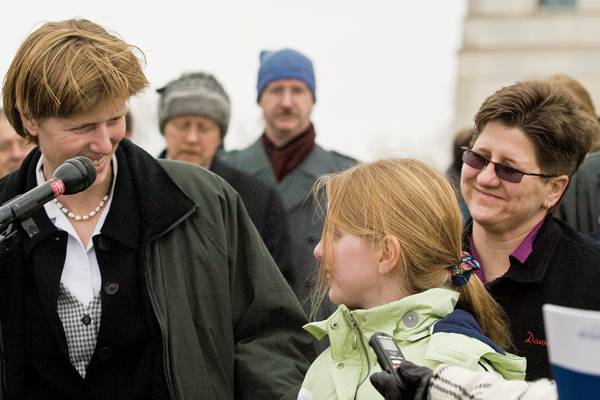Iowa Supreme Court hears oral argument for legal gay marriage

Jen BarbouRoske, left, and Jen’s partner, Dawn BarbouRoske, smile at their 10 year old daughter, McKinley BarbouRoske, Tuesday shortly after the Iowa Supreme Court listened to arguments about the state’s same-sex marriage law. McKinley said, “I love my parents and really am proud of them, thanks.” Photo: Jon Lemons/Iowa State Daily
December 9, 2008
DES MOINES — The Iowa Supreme Court heard oral arguments in Varnum vs. Brien on Tuesday, the case involving same sex marriage.
Last year, Judge Robert Hanson ruled that the ban on same sex marriage was unconstitutional, briefly allowing homosexuals to marry. Hanson put a stay on the ruling shortly after, and the case was appealed to the Iowa Supreme Court.
Dennis Johnson, of Dorsey and Whitney LLP in Des Moines, the co-counsel and cooperating attorney with Lambda Legal, the organization that filed the lawsuit on behalf of six same sex couples, was asked how allowing gay marriage would not open the door for other groups of people to get married, such as polygamists.
However, Johnson refuted the argument that allowing same sex couples to marry would redefine marriage, because marriage has always been between two people. He said because it is so heavily regulated by the state, allowing more than two people to enter into a union would create a complete transformation of marriage.
“It would require an entirely new array of statutes and case laws,” he said.
Assistant Polk County Attorney Roger Kuhle argued against Johnson.
Much of Kuhle’s argument was centered on marriage having a procreation function, and the tradition of it always having been between a man and a woman.
“The marriage we’re talking about has a function,” he said.
Justice Brent Appel questioned Kuhle on whether those who were sterile should be allowed to marry, since they too are not be able to procreate. Kuhle rebuffed the argument, arguing that although an infertile couple would not be able to procreate, they still would fit the definition of marriage.
“Their getting married does not distort the image,” he said.
Another part of Kuhle’s case was that it was optimal for a child to be raised in an environment with both a mother and a father.
“How does a father teach a girl… to be a woman,” he said.
Kuhle said the expert witnesses that were denied a hearing in the district court would have provided the information to back up these assertions.
Johnson also contended the defense’s procreation argument, saying no matter who is allowed to marry, people will always get married and have kids.
Johnson cited research that showed the most important thing for children is to have two parents that have good relationships with each other and their children, and that there was no evidence to show same sex marriage couldn’t do the same. In fact, he contended the state has already conceded the ability for same sex couples to parent because they are allowed to adopt and be foster parents.
Johnson said that by sending the case back to the district court because it was a summary judgment and the fact that some of the state’s witnesses were denied to testify would not be necessary because the testimony from the witnesses were included in this case.
He said the witnesses were not allowed to testify because none held degrees in sociology, but, rather, history, economics and religious studies.
Kuhle said the effects to marriage would not be immediate, but that it would break down over time.
“But, as our witnesses say, you’ve got to look into the future,” Kuhle said.
He said the state legalizing same sex marriage would be similar to arguing the nonessential nature of biological fathers and mothers, which would break down marriage because it would take away part of the incentive to being married.
Johnson called the argument “speculative.”
“My marriage would not be affected at all,” he said.
He also said the arguments about preserving traditional marriage were invalid.
“Tradition is no justification to continue discrimination,” he said.
Justice Mark Cady asked Johnson about the possibility of civil unions.
Johnson said unions would fall short because they would give homosexuals a second class citizen status.
Both attorneys were allowed to go over the allotted time for arguments — Kuhle by nearly 20 minutes and Johnson by 10.
Johnson later said in a press conference that he had never seen the justices let arguments go over before and go into such great detail.
David Twombley, a man named in the case, spoke afterwards outside of the courthouse.
“I’m a native Iowan and I’ve never been so proud of my state,” he said.
The Iowa Family Policy Center also had representatives speak after Lamda Legal.
Rev. Keith Ratliff, of Maplestreet Missionary Baptist Church in Des Moines, said his mind remained unchanged.
“Too many times God is taken out of the discussion,” he said.
Dan Berry, senior pastor at Cornerstone Family Church of Des Moines, said the case doesn’t concern the rights of a small, minority group of people,” but about marriage. He called on Christians to fight against the legalization of same sex marriage.
“If you are Christian, you need to pray,” he said.
















